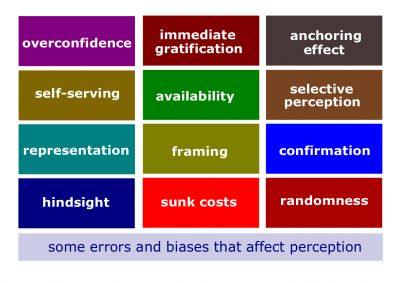Difference between revisions of "Perception shortcut"
(Created page with "400px|thumb|right|[[Perception shortcut]]Perception shortcut (hereinafter, the ''Shortcut'') is a shorter alternative route in cognitive processing. =...") |
(→Related coursework) |
||
| Line 12: | Line 12: | ||
*[[Illusory correlation]]. The tendency of people to associate two events when in reality there is no connection. | *[[Illusory correlation]]. The tendency of people to associate two events when in reality there is no connection. | ||
| − | ==Related | + | ==Related lectures== |
*[[Human Perceptions Quarter]]. | *[[Human Perceptions Quarter]]. | ||
[[Category: Septem Artes Administrativi]][[Category: Articles]] | [[Category: Septem Artes Administrativi]][[Category: Articles]] | ||
Latest revision as of 13:18, 4 January 2019
Perception shortcut (hereinafter, the Shortcut) is a shorter alternative route in cognitive processing.
Related concepts
- Bias. A tendency or preference toward a particular perspective or ideology.
- Hindsight bias. The tendency to believe falsely, after an outcome of an event is actually known, that one would have accurately predicted that outcome.
- Anchoring bias. A tendency to fixate on initial information, from which one then falls to adequately adjust for subsequent information.
- Availability bias. The tendency for people to base their judgments on information that is readily available to them.
- Assumed similarity. The assumption that others are like oneself.
- Randomness error. The tendency of individuals to believe that they can predict the outcomes of random events.
- Halo effect. The tendency to draw a general impression about an individual on the basis of a single characteristic.
- Contrast effect. Evaluation of a person's characteristics that is affected by comparisons with other people recently encountered who rank higher or lower on the same characteristics.
- Illusory correlation. The tendency of people to associate two events when in reality there is no connection.
